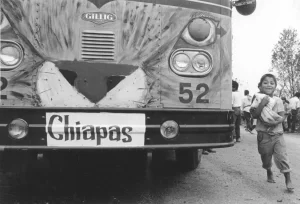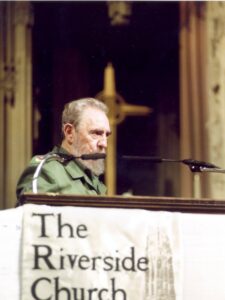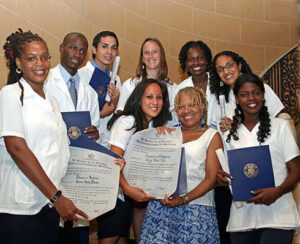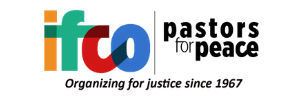Sowing the Seeds of Solidarity
1997 Caravan to Chiapas, Mexico

After several delegations and caravans to Chiapas, in November 1997 35 volunteers traveling in eight vehicles delivered more than 15 tons of humanitarian aid on the IFCO/Pastors for Peace Caravan to Chiapas and Nicaragua. The caravan had two major points of focus – providing a continued international presence in Chiapas where the US-backed Mexican military had increased its attacks on indigenous communities and delivering educational supplies and providing support to the University of the Autonomous Regions of the Caribbean Coast of Nicaragua (URACCAN). In March 2000, an IFCO/Pastors for Peace Caravan to Chiapas delivered more than 30,000 pounds of humanitarian aid to thousands of internally displaced indigenous people in Chiapas, Mexico, just months before the Mexican electionwhich ended the 72 year reign of the Institutional Revolutionary Party.
Cuba Caravans Continue
IFCO/Pastors for Peace continued to expand its Cuba caravans, reaching new communities on the island and increasing the travel and aid challenges with crossings at the Canadian border as well as Mexico. Following the success of the Fast for Life, IFCO initiated another successful crossing at the Canadian border as chronicled in this video featuring IFCO founder, Rev. Lucius Walker, Jr.
1999 Caravan to Honduras
In November, the IFCO/Pastors for Peace Caravan to Central America began its journey in Ft. Benning, Georgia to participate in a nationally coordinated demonstration against the US Army School of the Americas. This caravan included for the first time in IFCO’s history a solidarity program with Honduras. The caravan arrived in Honduras at the moment an investigation had begun of US-backed torture chambers and clandestine graves in El Aguacate, Honduras.
1999 Opening of the Latin American School of Medicine

Following a series of devastating hurricanes in Central America, President Fidel Castro opened a free medical school to avert future disasters. The campus of a former naval academy on Cuba’s north coast, just west of Havana, was quickly refurbished for this purpose, and the Latin American School of Medicine opened officially in March 1999. The second official delegation of the Congressional Black Caucus, organized by IFCO, visited Cuba in May-June 2000. During this visit, President Castro first made the offer of full scholarships for US students from the Mississippi Delta to study medicine at the Latin American School of Medicine in Havana. President Castro repeated his offer in his visit to NYC later that year.
IFCO organized two US-Cuba Friendshipment Caravans in 2000. Friendshipment X was dedicated to Cuba’s students and athletes; this caravan delivered educational aid and sports equipment in addition to valuable hospital equipment, an ambulance, and several school busses. Participants included the Lost Coast Pirates, a California baseball team of 10 to 12-year old boys who played a three-game series with kids in Cuba.
Friendshipment XI honored Cuba’s innovations in alternative energy by delivering solar panels and equipment to provide electricity for rural schools and health clinics in the rural mountainous zones of Cuba. Members of the 11th US/Cuba Friendshipment participated in Cuba’s Second World Solidarity Conference.
2001 First Class of ELAM Students & Caravans to Cuba
IFCO became the national center for administering the program of scholarships for US students to study medicine at the Latin American School of Medicine in Havana, Cuba. Eight US students entered the program in April, three more in July, and 28 in August.
By 2002, 60 students from all regions of the US were enrolled in the Latin American School of Medicine. With help from its Medical School Advisory Committee, IFCO continues to administer this historic program — which involves promotion, recruitment, selection, orientation, and follow-up support for these hard-working, ground-breaking students.
IFCO’s 14th US/Cuba Friendshipment in Summer 2003 focused on the needs of Cuba’s elderly and celebrated a bold travel challenge in conjunction with the Venceremos Brigade in the face of an intensified attack on our constitutional right to travel to Cuba by the Bush administration in face of majority US public and Congressional support for normalizing relations with Cuba. 110 caravanistas traveled to Cuba without a license and visited schools, hospitals, elder care centers, the Latin American School of Medicine to speak with the US students and Cuban administrators.
2007 First Graduate of ELAM

In 2005 the first US student of ELAM graduated. Two years later, the first group of US students finished their studies. This is how the Latin American Medical School was founded: Cuba offered 500 full scholarships per year, for the next ten years, to students from the four nations affected by Hurricanes Mitch and Georges. In this way, Cuba would be training 5000 new doctors — young people who would not otherwise have had access to medical education — to serve in communities that had never had access to quality medical care. The only condition attached to the scholarship was that the students had to make a commitment to return to their home countries, where they would provide medical service in the communities where they were most needed — the poorest, the hardest-hit, the most remote communities of their home countries.
